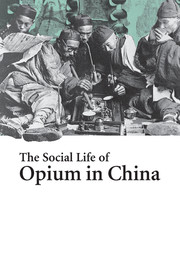Book contents
- Frontmatter
- Contents
- List of illustrations
- List of maps
- List of tables
- Acknowledgements
- Introduction
- 1 ‘The art of alchemists, sex and court ladies’
- 2 As the empire changed hands
- 3 ‘The age of calicoes and tea and opium’
- 4 ‘A hobby among the high and the low in officialdom’
- 5 Taste-making and trendsetting
- 6 The political redefinition of opium consumption
- 7 Outward and downward ‘liquidation’
- 8 ‘The volume of smoke and powder’
- 9 ‘The unofficial history of the poppy’
- 10 Opiate of the people
- 11 The road to St Louis
- 12 ‘Shanghai vice’
- Conclusion
- Notes
- Glossary
- Bibliography
- Index
6 - The political redefinition of opium consumption
Published online by Cambridge University Press: 05 June 2012
- Frontmatter
- Contents
- List of illustrations
- List of maps
- List of tables
- Acknowledgements
- Introduction
- 1 ‘The art of alchemists, sex and court ladies’
- 2 As the empire changed hands
- 3 ‘The age of calicoes and tea and opium’
- 4 ‘A hobby among the high and the low in officialdom’
- 5 Taste-making and trendsetting
- 6 The political redefinition of opium consumption
- 7 Outward and downward ‘liquidation’
- 8 ‘The volume of smoke and powder’
- 9 ‘The unofficial history of the poppy’
- 10 Opiate of the people
- 11 The road to St Louis
- 12 ‘Shanghai vice’
- Conclusion
- Notes
- Glossary
- Bibliography
- Index
Summary
This chapter examines both the initial and the continual political reinterpretations and discussions of opium, and also the arrival of the consumer trend or epidemic of opium smoking on the eve of the first Opium War. The year 1834 was a milestone in the social life of opium, because the East India Company's exclusive trading right in China ceased and the trade was thrown open to all so-called ‘private English’. The Chinese Repository hailed it as the ‘triumph of principles’. When free trade triumphed, opium smoking became a pathological problem. When free trade failed, gunboat diplomacy was applied. Michael Greenberg's understanding of the political consequences was to the point: ‘the most immediate result of the victory of the free-traders was to bring the power of the British state to bear directly on the China trade’. The Chinese failed to realise that who they now dealt with were not only the private English but also subjects of Her Majesty. They called Lord Napier, the first British Superintendent of Trade, Daban/Taipan or Chief Merchant, and this meant that for the Chinese he could never represent a sovereign. The year 1834 did not bring the kind of victory the private English had hoped for. Free trade drew too many free-traders and too much wild speculation. James Matheson lamented in 1837: ‘We are still pegging away here, pretty much as you left us and almost sighing for a return of the Company's monopoly in preference to the trouble and endless turmoil of free trade.’
- Type
- Chapter
- Information
- The Social Life of Opium in China , pp. 87 - 100Publisher: Cambridge University PressPrint publication year: 2005

